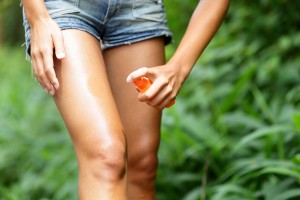 The Environmental Working Group (EWG) is my go to place for evaluating the safety of products. They are not as focused on using only natural products like I am, but this organization’s main concern is health safety.
The Environmental Working Group (EWG) is my go to place for evaluating the safety of products. They are not as focused on using only natural products like I am, but this organization’s main concern is health safety.
Recently, EWG released their 2013 edition of the Guide to Better Bug Repellants. Given the seriousness of many insect-borne diseases, EWG top three picks are chemicals I would never use, such as DEET.
Researchers at EWG reviewed the available safety and efficacy data of repellent chemicals in virtually every bug repellent for sale in the U.S. and highlighted four ingredients as top picks:
— Picaridin
— IR3535
— DEET
— Oil of Lemon Eucalyptus or its synthetic derivative PMD
No single product is best for everyone in every situation, but EWG’s researchers concluded that these four chemicals can provide long-lasting protection from ticks, mosquitos and other bugs. When used properly, each poses relatively few health concerns.
Though DEET has been much maligned, and in rare cases, intense doses have been linked to nervous system impairment, an extensive review of the scientific literature found few reports of serious health hazards when the chemical was used sparingly, as the maker’s instructions specify.
I have been in many swarms of mosquitoes in remote wilderness lakes, and as EWG reports, many botanical repellents are not that effective.
EWG research indicates that unregistered botanically based bug repellents are not often the best choice. The most common contain castor oil, cedar oil, citronella oil, clove oil, geraniol oil, lemongrass oil, peppermint oil, rosemary oil and soybean oil. While effectiveness varies, and there may be a few exceptions, most botanicals repel bugs for a short time, if at all.
There are few data available on botanicals because the EPA has classified them as “minimum risk” pesticides, meaning, they are exempt from registration and efficacy testing. But “minimum risk” does not mean safe. Products based on these botanical ingredients generally contain known human allergens – often at much higher concentrations than personal care products.
These natural repellents require repeated application, sometimes within 10 minutes of one another. I do find that they work, but it is short lived and requires a lot when the mosquitoes are thick. I would rather do this than expose myself and children to chemicals.
The best solution is wearing layers of clothing the bugs cannot penetrate. That being said, when it is really hot outside, this is hard to do.
There is one naturally-derived repellent ingredient EWG does recommend. [amazon_link id=”B004N59OFU” target=”_blank” ]Lemon Eucalyptus Natural Insect Repellent[/amazon_link]. I haven’t tried this, but I plan to!
EWG does caution:
Don’t Use:
• Oil of Lemon Eucalyptus/PMD on children younger than 3 years old.
• More than 30 percent DEET on anyone.
• Any bug repellents on children under 6
months.
• Outdoor “fogger” insecticides. They contain more toxic ingredients than repellents applied to skin.
• Candles. They may not be effective. They emit fumes that could trigger respiratory problems.
• Aerosol sprays in pressurized containers. You’ll inhale chemicals, and you could get sprayed in the eyes and face.
• Repellent mixed with sunscreen. When you reapply sunscreen every two hours as ad- vised, you overexpose yourself to repellent.
• Bug zappers and treated wristbands. They’re ineffective. Save your money.
I like to be outside. That comes with some risk.
I try not to worry about bug-borne illnesses. The rates of these diseases are increasing, and it is only going to get worse from the effects of climate change. We have had a very bad tick year in northern California. Everyone in my family has been bit.
I will not live my life in fear nor will I resort to chemicals. Covering up and using natural ingredients, as well as checking yourself after hiking, is the best solution!
Image: Mosquito repellent. Woman spraying insect repellent on skin outdoor in nature using spray bottle on Bigstock
I have been using a product called Sweetly Citron on Amazon and it is deet free.
Works great and smells good.